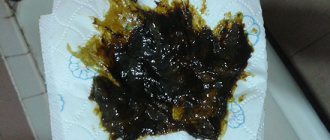Black diarrhea is a serious and life-threatening symptom that should not be ignored. Loose stools can appear due to physiological factors (the use of certain medications, coloring products), or perhaps due to internal bleeding, which requires urgent hospitalization. Therefore, if dark stool forms, you should definitely consult a doctor for a diagnosis.
Physiological factors
Not in all cases, black diarrhea in an adult indicates bleeding. There are medicinal and non-medicinal reasons for the formation of such a sign.
Medicines
There are medications that change the color of stool. For example, ordinary activated carbon. The product is a sorbent and is not absorbed into the stomach. But it effectively absorbs various toxins, removing them along with feces. But after it, if the person is healthy, the stool should not become liquid.
The black color appears when taking medications that contain iron or bismuth. Separately, it is necessary to note drugs containing a significant amount of acetylsalicylic acid. Their intake does not color the stool, but long-term consumption causes bleeding with the formation of black diarrhea.
Nutrition
Non-drug causes of black diarrhea can occur after consuming foods:
- blood sausages;
- beets, tomato juice;
- prunes, blueberries;
- liver;
- drinks with dyes;
- red wine;
- alcohol.
Dark liquid stools, which are physiological in nature and observed after eating, are not dangerous for humans. This manifestation is temporary and will soon pass. The disorder does not require specific treatment; you just need to reconsider your diet. When diarrhea continues for more than 3 days, you should consult a specialist.
Often, drinking alcoholic beverages leads to stool upset, especially if it is taken for a long time, and the product is of poor quality. It is precisely the black color of diarrhea that becomes acute alcohol poisoning. Toxic substances cannot be removed from the body in time, so intoxication occurs.
Normal stool color
The causes of black diarrhea in an adult can be associated both with the consumption of food that stains feces, and with the development of diseases of the digestive organs. In a healthy body, stool with a balanced diet is brown.
- A dark shade indicates frequent consumption of meat, constipation, and putrefactive processes.
- Light colors are observed with increased intestinal motility and the predominance of dairy and plant products in the daily diet.
- If your stool turns orange, you may be consuming beta-carotene-enriched vegetables.
- A reddish tint to feces appears when bleeding occurs in the lower intestines, for example, with long-term non-healing anal fissures, difficulties with bowel movements, inflammation of the mucous membrane of the colon. Beets can also help change the normal color to red.
- A green tint occurs with dysbacteriosis, increased intestinal motility associated with the consumption of large volumes of greens (sorrel, spinach, lettuce).
Accompanying illnesses
A healthy person's stool is brown. This is caused by bile, it moves through the intestines, creating this color. A change in the color or consistency of stool indicates intestinal disorders.
The appearance of black diarrhea may indicate bleeding directly in the upper regions of the gastrointestinal tract: the esophagus and stomach, less often the duodenum is affected. Before penetrating into the feces, blood combines with bile and gastric juice and is not excreted in the form of veins, but completely changes its color to black.
Dark diarrhea occurs for various reasons. For example, the following gastrointestinal diseases can cause internal bleeding:
- Stomach ulcer. The pathology is associated with damage to the organ mucosa. Under the influence of some food or gastric juice, the ulcers begin to bleed. Blood flows from the stomach into the intestines, creating a black color. A person suffers from abdominal pain and sometimes vomiting. Factors include unhealthy food, constant stress, and the bacterium Helicobacter pylori.
- Stomach cancer. The disease initially passes without any symptoms and is discovered during a random examination. The formation of black diarrhea indicates progression of the disease.
- Varicose veins of the esophagus. This disorder often leads to black stools, but does not always cause loose stools. The veins of the esophagus are very weak and can easily be damaged by food.
- Gastritis. There are many types of pathology; erosive gastritis can provoke bleeding.
- Polyps. Such benign neoplasms are based in the esophagus and stomach. If detected, they should be removed immediately, as they can transform into a cancerous tumor.
The above pathologies are accompanied by other symptoms: nausea, increased body temperature, general malaise, dark vomit, dizziness and fainting.
To prevent this, any stomach disease requires proper treatment.
First aid for black stool in a child
Constant diarrhea leads to dehydration of the baby. Dehydration is characterized by dry skin, lips, tongue, and severe thirst. No urine is released for 3–6 hours. This condition threatens the child's life. At the first such signs, call an ambulance and take urgent measures:
- The main help of parents is to prevent dangerous dehydration. To do this, you need to give the child 1 tsp of water. every 10–12 minutes. The fastest way to restore the water-salt balance are pharmaceutical powders that are pre-diluted with water - Regidron, Glucosolan. A product of this composition can be easily prepared at home. Dissolve 2 tbsp in 1 liter of bottled or any water. l. sugar and 1 tsp. soda and salt. Pour 1 tsp into the baby's mouth. solution every 10–12 minutes.
- Give enterosorbents - Smecta, Laktofiltrum, Enterosgel. These drugs contain substances that bind toxins that have entered the body.
- If the temperature is elevated, use a rectal suppository with Efferalgan or Paracetamol or give the child a syrup containing these drugs to drink
The child needs to be unsoldered until a team of doctors arrives.
No antidiarrheals should be given to infants. They stop peristalsis and prevent self-cleansing of the intestines.
Diarrhea during pregnancy
During pregnancy, hormonal changes occur in the female body, tastes and desires change. Black loose stools are a common manifestation during this period.
The reasons for this are quite simple. While carrying a child, a woman takes vitamin complexes and other supplements for the proper development of the fetus. In some formulations, an increased amount of iron predominates, which leads to changes in stool. This sign indicates that the vitamins taken are absorbed properly. Their excess leaves the body in this way.
In what cases can you not worry about your health?
The causes of black diarrhea are not always hidden in serious diseases. Sometimes this is how the body reacts to improper loads on it. And in this way it simply warns that something needs to be changed either in the diet or in the lifestyle.
Black stools can be caused by the following factors:
- Eating large amounts of beets or drinking plenty of beet juice.
- Drinking tea - hibiscus.
- Dark diarrhea often appears after drinking alcohol.
- Wrong choice of diet.
- Taking part of the vitamin and mineral complexes.
- Eating dark-colored foods that can stain feces.
- Taking absorbents, such as activated carbon.
If you remember that on the eve of the appearance of black diarrhea, something from this list happened to you, and there are no more changes, and the stool gradually returns to its usual brown color, then there is no need to sound the alarm.
This is a completely normal reaction of the digestive system to these irritants. And in order for diarrhea to go away after alcohol, you need to drink as much fluid as possible and switch to a balanced diet for several days in order to give the body the opportunity to recover. After all, in this way it reflects intoxication, which manifests itself as black feces.
On a note. After taking antibiotics or undergoing general anesthesia, black feces are considered normal, since all microflora from the intestines are washed out. This condition is not dangerous if the intestines are properly populated under the supervision of doctors with beneficial microorganisms in the form of probiotics of a certain group.
Among other things, you can sometimes encounter loose stools with black spots, this is often quite normal, and you just need to observe the feces for several days. These scary inclusions are actually just undigested food particles that are dark in color. These can be grains of berries, skins of sunflower seeds and other products.
Diagnostics
A special feature of the study of the gastrointestinal tract is the study of internal disorders. Diagnostics involves the following activities:
- colonoscopy - examines the lower digestive tract; a thin tube is passed through the anus, which allows you to see the condition of the stomach;
- gastroscopy - the method examines the upper regions of the gastrointestinal tract; A tube is inserted through the mouth into the esophagus, it helps to examine the patient’s stomach and intestines, and, if necessary, tissue is taken for a biopsy.
With the appearance of black stool, not only hardware diagnostic methods are performed, but also stool and blood tests are performed. Having ruled out possible causes and established the exact pathology, the doctor prescribes therapeutic actions.
Diagnostic measures
If you experience diarrhea with black mucus, you should immediately consult a doctor. He will listen carefully to the symptoms, study the outpatient card and prescribe an examination.
To clarify the cause of the pathology, the following procedures are prescribed:
- FGDS;
- colonoscopy;
- blood analysis;
- stool analysis.
What do these medical studies provide?
FGDS
FGDS is esophagogastroduodenoscopy. A procedure in which a person swallows a thin tube with a miniature video camera attached to the end. The research method allows you to see exactly what caused the internal bleeding.
Using FGDS, you can examine the condition of the stomach, esophagus and duodenum. Although the procedure is unpleasant, it gives the doctor complete information about the state of the gastrointestinal tract.
We recommend: Why does diarrhea occur after anal sex?
Colonoscopy
This is a procedure in which a probe is inserted through the anus and makes it possible to examine the lower gastrointestinal tract.
Conducting laboratory tests
Laboratory analysis allows the doctor to see whether there are intestinal infections in the body and at what level of hemoglobin. These data allow you to get a complete picture of the state of the body and not make mistakes when making a diagnosis.
Treatment
When black diarrhea in an adult is single in nature, then antidiarrheal medications or following a certain diet will be sufficient. And when a symptom occurs frequently, it is already due to some disease.
Doctors prescribe the following actions:
- If black diarrhea is provoked by physiological factors, it can be eliminated using the following medications (Enterol, Smecta, activated carbon, Nifuroxazide, Eubicor).
- Ulcers, acute and chronic gastritis are mainly associated with the bacterium Helicobacter pylori. In these cases, antibiotics (Amoxicillin, Cefotaxime) are prescribed, used for no more than 10 days, and medications that reduce the acidity of gastric juice. Various pathologies of the digestive system are treated in a comprehensive manner. In addition to medications, diet and rest are necessary. Peritonitis and perforation often worsen the ulcer. This phenomenon requires surgical intervention.
- Polyps in the stomach must be removed. There can be no other treatment. A complication of their appearance is that they can develop into a malignant tumor. When they are removed, people need to regularly visit a doctor for check-ups, follow a diet, and eliminate bad habits.
- The danger of internal bleeding associated with black diarrhea is stomach cancer and a sad outcome. Neoplasms in this organ are treated with surgery and chemotherapy. Surgery is performed only if there are no metastases. Unfortunately, by the time clear symptoms are noticed and it is too late to treat the cancer, metastases have already existed.
In case of serious illnesses (bleeding, tumors), you should never self-medicate!
Treatment of black diarrhea with folk remedies
As for folk methods of combating diarrhea, the most useful in this case is rice water.
For these purposes, it is necessary to boil half a glass of cereal in 1 liter of water over low heat for one and a half hours.
After this, let the resulting liquid cool and strain it. The decoction should be drunk 100 g instead of eating food up to 5 times during the day.
A very effective remedy in the fight against black diarrhea is a solution of potato starch.
For this you need 1 tsp. dilute the powder with 0.5 cups of boiled water, mix it and take 2 to 3 times during the day before meals.
A decoction of blueberries helps to cure pathology. For this you need 1 tbsp. l. Dried berries pour 0.5 liters of water, then boil for several minutes over low heat until half the liquid volume has evaporated.
The resulting decoction should be taken 1 tbsp. l. several times during the day before eating.
A very effective remedy in the fight against diarrhea is a mixture of horse chestnut.
For this, 1 tsp. crushed fruit, pour 0.5 liters of hot water and leave for 3 hours.
The resulting product should be taken half a glass 3 times during the day before meals.
A very useful fruit in the fight against diarrhea is pomegranate. For healing, take the peels of the fruit, pour 2 liters of boiled water over them and leave for 1 hour, wrapped in a towel.
You can also drink pomegranate juice if you dilute it with water in a ratio of 1 to 2. The duration of the course of such treatment is 1 day.
Diet
For diarrhea, in addition to medications, a special diet is necessary. The basic rule is to eliminate salty, spicy, fatty foods, spices, marinades, and preserves from the diet. Avoid drinking soda and baked goods.
Food should be healthy and light. There is no need to overwork the intestines; it needs rest. For diarrhea, lean meats (rabbit, chicken), rice porridge cooked in water are allowed. To prevent dehydration, you should drink plenty of water.
How to provide first aid?
If you find other alarming signs in your baby along with black feces, you need to call a doctor and try to alleviate the child’s condition.
- Firstly, the baby needs to be provided with bed rest.
- Before the doctor arrives, you cannot give any food, you can only give cold water.
- It is recommended that you do not throw away stool and show it to your doctor first. Upon arrival, the specialist will examine the baby, provide first aid and refer for additional examinations, for example, stool, urine and blood tests, as well as ultrasound and gastroscopy, which will help identify the cause of the symptom and then prescribe the correct treatment.
Parents whose child already has a history of diseases of the digestive tract should be most concerned about black stool in their baby. For example, if a child has gastritis, peptic ulcer, Crohn's disease, stomach or intestinal cancer. Particular attention to the color of stool should be paid to parents of a child suffering from hepatitis or cirrhosis of the liver.
| 2 | Products with natural dyes. | Childhood and adolescence can cause black bowel movements due to the consumption of blood sausage, ripened tomatoes or beets, black currants and prunes. |
| 3 | Medications. | Black stools can be observed if medications containing iron are prescribed (Ferrum-Lek, Sorbifer). There are also cases that do not cause concern (the use of activated carbon). |
Prevention
It is quite difficult to prevent black diarrhea caused by bleeding. But you can reduce the likelihood of aggravation. Prevention means:
- take any medications with caution;
- observe the dosage (Aspirin in excess of the norm provokes bleeding);
- carry out gastrointestinal therapy in a timely manner;
- perform hand hygiene;
- vegetables and fruits must be thoroughly washed;
- do not eat expired foods (milk, eggs).
Anyone should understand why dark-colored diarrhea occurs and try to avoid the factors causing the disorder. It is recommended to undergo periodic examinations. If gastrointestinal diseases are detected, treat immediately.
We recommend: Why does an adult have green diarrhea - what are the reasons?
Why is diarrhea dark in color?
Stool that suddenly turns black against the background of loose stool can very often be a clinical sign of internal bleeding. This is usually caused by erosion of a blood vessel, which is located in the place where the duodenal or stomach ulcer formed. Experts recommend that a person with a history of these diseases monitor very carefully any changes in the structure and color of stool. If they suddenly develop black diarrhea, this is a reason to immediately contact a specialist.
Along with darkening of loose stools, when internal bleeding occurs, patients also experience other negative symptoms of a life-threatening condition: black or scarlet vomiting, pallor, dizziness, decreased blood pressure and hemoglobin levels. In addition to ulcers in adults, the reason why diarrhea suddenly turns black can be varicose veins of the esophagus, tumors in the stomach, and various intestinal diseases. Dangerous pathologies such as histoplasmosis, Crohn's disease, gastritis or esophagitis may also be responsible for this condition.
Symptoms
Symptoms and signs of black diarrhea:
- Pale skin
- Discomfort in the stomach
- General deterioration in health
- Drowsiness
- Apathy
- Nausea
- Dizziness
- Loss of appetite
- Fever
- Abdominal pain
- Mucus in stool
If you have an elevated temperature, frequent trips to the toilet for 2-3 days, mucus in your stool, or severe abdominal pain, consult a doctor for diagnosis and treatment.
Dark stool due to medication use
A similar effect can be caused by medications with iron, systemic drugs (for example, dietary supplements), as well as bismuth-containing drugs (usually used to defeat intestinal ulcers and diseases of the duodenum). Activated carbon, as you know, is widely used for poisoning, and in the process of removing it and associated toxins from the body, pigmentation occurs in such a dark or even black color.
Certain anti-inflammatory drugs (for example, Ibuprofen or Nimestil) when used for a long period of time in the treatment of colds and flu cause severe darkening of the stool. It is important to know that medications containing a significant amount of acetylsalicylic acid do not directly cause darkening of stool, but they can have a detrimental effect on the circulatory system, causing internal bleeding.
Interpretation of adult stool color
The consistency and shape of feces depend mainly on the content and amount of liquid (water). The usual brown color is due to the presence of stercobilin, one of the products of bile metabolism. Other shades, under normal conditions, appear only in the case of a shift in eating habits in one direction or another, as well as when using specific medications.
When an adult begins to use a lot of milk for food, the stool turns yellow and becomes a lighter shade of brown. With a passion for plant products, the color can change right up to the border of the green or red spectrum. But when eating excess meat, it becomes darker, even dark brown in color.











